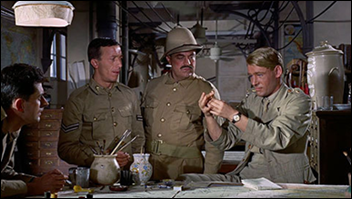Re: Walmart Health: Just had a great dental visit this morning, which was preceded by helpful reminders from Epic, and…
DOCtalk with Dr. Gregg 12/15/14
Pain, EMRs, and Appreciation
Did it ever occur to you how rarely you notice the absence of pain? I mean, it’s easy to notice pain. Pain sends a “HEY!” message that interrupts your stream of consciousness to make sure you pay attention. But the lack of pain often goes unnoticed, and often much underappreciated.
Pain is always “appreciated” by your brain for its reminder that something isn’t right. Pain can be both … well … a pain, but also a friend; it lets you know when something needs attention. (But it’s also something that can be managed with more than an “ouch” or a whine.) And just as importantly, the lack of pain should be something that is more often acknowledged and valued.
Near the beginning of the classic and epic movie Lawrence of Arabia, a young T.E. Lawrence shows some of his mapmaking military buddies how he can a hold a lit match, unflinchingly, until it burns down to his fingers and goes out. When a cohort, William Potter, tries the same and recoils in burning pain, he asks, “What’s the trick, then?” Lawrence’s response? “The trick, William Potter, is not minding that it hurts.”

That scene and those lines have held a special meaning for me. Years ago, I began having daily “chronic cluster headaches,” a major pain to say the least. They have been dubbed “the worst head pain known to man” and are nicknamed “the Suicide Headaches.” (People have been known to commit suicide not only during one of the excruciating pain episodes, but also in between, in dreaded anticipation of the next.) Women who have them say they’d rather go through childbearing than another cluster headache.
Not surprisingly, having one to eight of these nasty, far-worse-than-a-migraine episodes every day of your life for years can be life-stealing. In fact, they very nearly did take over my whole life. But, when pain is that all enveloping, you sort of have two choices: Succumb to it, or figure out a way to turn it into a background noise – a part of your life, but not the central part of it. That decision was enabled by the remembrance of a movie line – a great movie line to be sure, but still a movie line – where young Lawrence of Arabia first shows his unique life views.
That line has continued to inspire me as I so often have been forced to reflect upon pain, its value, and its point.
Yes, you can learn to “manage” pain, but one of the key things I’ve also noted in dealing with a plethora of pain is that its absence is so poorly appreciated. Honestly, when was the last time you noted – and appreciated – the fact that you didn’t have a headache, or a sore throat, or a stomachache. When you have a pain, it’s so easy to focus upon it and wish for its disappearance. But when it’s gone – like when you wake up in the morning and that dull, achy headache you had the night before isn’t there – how easy is it to get up and go on about your day before you even remember that you had a headache the day before (if you ever do)?
But, let me tell you, because of the unique nature of cluster headaches, I’ve become a true connoisseur of the absence of pain. By that I mean, clusters hit fast, all of a sudden, and amazingly they also tend to go away almost as quickly. One moment you’re in pure and total agony; the next moment you have this overwhelming sense of joy that the anguish is over. When you’re faced with such pure pain, repetitively, day after day, and then when you also repeatedly experience the utter relief that comes at a moment’s notice when the pain subsides, you become exquisitely sensitive to the value of the absence of pain.
How does this relate to healthcare IT? Here’s an example. Today, my EMR vendor (Elation) added a few really cool, though small, updates that made several areas of my workflow even better. (Their workflow is already the best I’ve ever seen.) The updates eliminated a few “pain” points that we had dealt with using minor workarounds. Nothing major, but little “flinches” of workflow pain that occurred every time they disrupted the daily routine. So, today, when I didn’t have to deal with those little moments of aggravation – those little moments of pain – it occurred to me that the feeling was similar to the relief of pain I have so learned to value with clusters: Every day when I don’t feel pain, or when pain subsides, I’m exquisitely aware of the blessing.
Projecting this appreciation of the lack of pain onto my EMR may seem a bit of a reach, but it really isn’t. Appreciating good things and maintaining an awareness of them is a challenge because it’s the pain points that so typically draw our attention. When so many providers are now dealing daily with the frustrations of new digital workflows and all the changes those alteration have wrought, it’s the pain points we all tend to focus upon. “Why doesn’t my system do this thing that the system at the hospital does?” “Why can’t my vendor make this little change I want when it seems so simple?” “Why can’t this be as easy as writing with pen and paper used to be?”
It’s so easy to be lasered in on the problems and aggravations while forgetting the advantages. How easy is it to schedule on your EMR or EHR compared to paper schedules? (Remember those nightmares?) How wonderfully painless is e-prescribing? How much better are your notes, and how much more legible to others? How much more engaged are you with your patients when they start understanding and utilizing your patient portal? How about those clinical decision support reminders – the ones everybody struggles to balance? Have they ever helped you avoid missing an important care point or prevent a missed test or vaccine? How much – how very much – easier is it to find things in your patient charts? How much more insight can you have now into the intimate parameters of you practice, both clinical and managerial?
The trick, William Potter, is not minding that the pain points hurt, at least until they might one day be resolved … and to remember to count your blessings, your lack of pains.
From the trenches (with happy holiday wishes to all) …
"I can’t make out whether you’re bloody bad-mannered or just half-witted.” – Gen. Sir Archibald Murray (to Lawrence)
“I have the same problem, sir.” – Lawrence of Arabia

Dr. Gregg Alexander, a grunt in the trenches pediatrician at Madison Pediatrics, is Chief Medical Officer for Health Nuts Media, an HIT and marketing consultant, and sits on the board of directors of the Ohio Health Information Partnership (OHIP).
Contacts
Mr. H, Lorre, Jennifer, Dr. Jayne, Dr. Gregg, Lt. Dan, Dr. Travis
More news: HIStalk, HIStalk Connect.
Get HIStalk Practice updates.
Contact us online.
Become a sponsor.


Great article. The comment about “a few really cool, though small, updates” made me think of Joel Spolsky’s excellent blog of old, “A game of inches”. There is a long lead-in to the meat that boils down to this:
“Commercial software—the kind you sell to other people—is a game of inches.
Every day you make a tiny bit of progress. You make one thing just a smidgen better.
…
There are thousands and tens of thousands of these tiny things.
It takes a mindset of constant criticism to find them.
…
And as you fix more and more of these little details, as you polish and shape and shine and craft the little corners of your product, something magical happens. The inches add up to feet, the feet add up to yards, and the yards add up to miles. And you ship a truly great product. The kind of product that feels great, that works intuitively, that blows people away. The kind of product where that one-in-a-million user doing that one-in-a-million unusual thing finds that not only does it work, but it’s beautiful: even the janitor’s closets of your software have marble floors and solid core oak doors and polished mahogany wainscoting.
And that’s when you know it’s great software.”